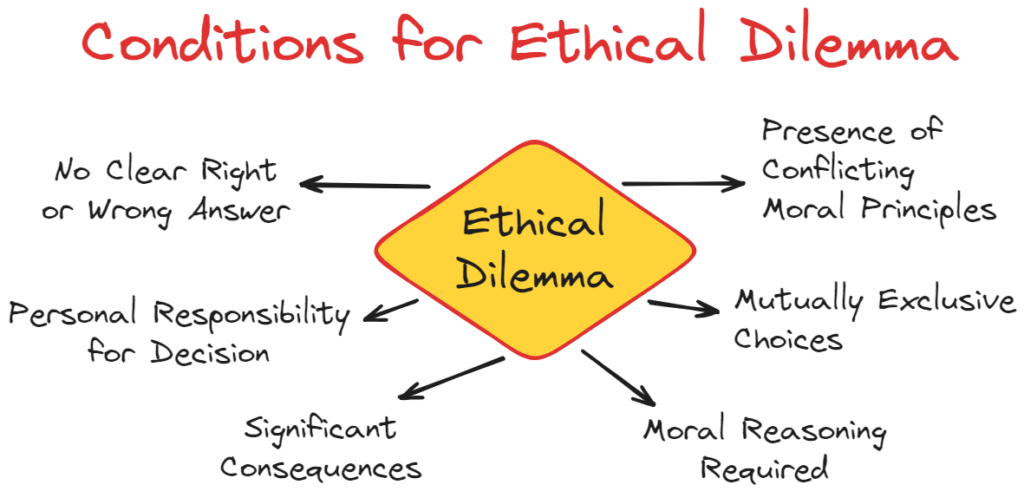What is Ethical Dilemma ?
Ethical Dilemma
An ethical dilemma is a situation in which a person faces a choice between two or more actions, each of which has a significant ethical dimension, and where choosing any one action means compromising on another ethical principle. It involves a conflict between moral imperatives, where to obey one would result in transgressing another. Ethical dilemmas are challenging because they often require a person to prioritize ethical values in a way that may not be immediately clear, and the decision can have significant consequences.
Conditions for an Ethical Dilemma:
- Presence of Conflicting Moral Principles: There must be at least two conflicting ethical principles or values that are relevant to the situation.
Example: A doctor treating a teenager discovers they are using illegal drugs. The doctor faces a conflict between respecting patient confidentiality and the need to inform the teenager’s parents to protect the teenager’s health. - Mutually Exclusive Choices: The choices available to the person facing the dilemma are mutually exclusive, meaning that choosing one option necessarily precludes the other(s).
Example: A journalist has information that could prevent a public figure from being wrongfully accused but publishing the information would violate a promise of anonymity to a source. The journalist must choose between protecting the source and preventing an injustice. - Significant Consequences: The choices involved in the dilemma must have significant moral consequences.
Example: A software engineer discovers a vulnerability in their company’s software that could be exploited. Reporting it could delay the product launch, affecting the company’s revenue and possibly leading to layoffs. Not reporting it could endanger users. The engineer’s decision has significant consequences either way. - Personal Responsibility for Decision: The individual facing the dilemma must have a personal stake in the decision-making process.
Example: A software engineer discovers a vulnerability in their company’s software that could be exploited. Reporting it could delay the product launch, affecting the company’s revenue and possibly leading to layoffs. Not reporting it could endanger users. The engineer’s decision has significant consequences either way. - No Clear Right or Wrong Answer: In a true ethical dilemma, there is no clear “right” or “wrong” answer that can be easily determined by applying ethical principles.
Example: A manager knows that one of their employees is going through a tough personal time, which is affecting their work performance. The manager must decide whether to recommend the employee for a layoff, which is imminent due to company downsizing, or to protect the employee’s job, potentially risking their own position for not meeting departmental performance criteria. - Moral Reasoning Required: The resolution of an ethical dilemma requires moral reasoning.
Example: A principal at a school learns that a popular teacher has falsified some credentials but is also aware that this teacher has had a profoundly positive impact on students’ lives and the school community. The principal must engage in moral reasoning to decide whether to dismiss the teacher for the falsification or to find a way to keep the teacher on staff because of the positive contributions.

